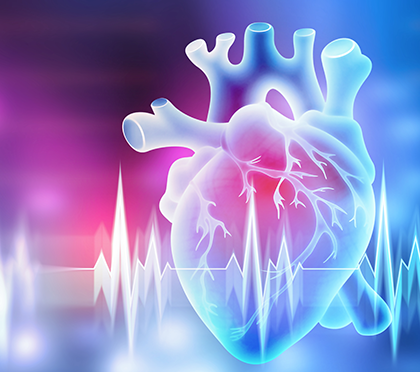Recognizing the Relevance of Cardiology in Modern Healthcare Services
Cardiology plays a vital duty in modern-day healthcare, particularly as heart illness remains to be the leading reason for death worldwide. Breakthroughs in diagnostics and therapy have actually changed patient care, enabling earlier interventions and improved outcomes. The shift in the direction of preventative cardiology equips individuals to handle their health and wellness proactively. As modern technology proceeds to advance, the combination of innovative options might even more redefine cardiology's effect on public health and wellness, triggering a better evaluation of emerging fads and their effects.
The Occurrence of Heart Illness and Its Effect On Public Health
Although heart problem continues to be the leading reason of death globally, its influence expands much past private patients to influence public health and wellness systems and economic climates. The high frequency of heart illness places a substantial stress on medical care sources, necessitating raised funding for therapy, rehabilitation, and avoidance programs. Public health and wellness campaigns need to address danger factors such as weight problems, smoking, and inactive lifestyles, which add greatly to the increasing incidence of heart conditions.Moreover, the financial burden linked with cardiovascular disease is enormous, incorporating not only direct medical prices but likewise indirect expenditures associated with lost performance and premature mortality. Communities deal with difficulties in taking care of these costs, typically bring about disparities in health care accessibility and end results. As the populace ages and lifestyle-related risks remain to rise, the necessity for efficient cardiology treatments ends up being extremely important. Resolving heart illness is not only a matter of private health yet additionally an important public health and wellness top priority.
Advancements in Cardiac Diagnostics and Imaging Techniques
Recent improvements in cardiac diagnostics and imaging methods have transformed the area of cardiology, enhancing the capability to find and monitor heart problem. Methods such as cardiac MRI, CT angiography, and echocardiography have actually ended up being increasingly innovative, offering thorough photos of heart frameworks and features. These methods enable for the very early recognition of problems like coronary artery condition, heart failing, and valvular disorders.Moreover, developments in non-invasive diagnostics, such as wearable innovation and remote surveillance devices, have actually equipped clients and health care carriers. These devices assist in real-time tracking of heart rhythms and other vital indicators, resulting in prompt interventions. Additionally, artificial knowledge is being incorporated into imaging evaluation, improving accuracy and effectiveness in diagnosis.
Innovations in Treatment Choices for Heart Conditions
Recent innovations in cardiology have resulted in substantial developments in therapy choices for heart problems. These include advanced surgical techniques that improve procedural outcomes and emerging medicines that use new opportunities for therapy. As the area evolves, these advancements play a vital role in improving patient care and outcomes.
Advanced Surgical Techniques
Technologies in medical methods have actually transformed the landscape of cardiology, supplying brand-new expect clients with heart disease. Minimally intrusive treatments, such as catheter-based treatments, have greatly reduced recuperation times and medical facility keeps. Techniques like robotic-assisted surgical treatment enhance accuracy, permitting specialists to navigate complex physiological frameworks with better precision. Moreover, advancements in imaging technology promote real-time visualization during procedures, boosting end results. Transcatheter aortic valve replacement (TAVR) exemplifies a breakthrough in treating aortic constriction, allowing shutoff replacement without open-heart surgical treatment. Furthermore, hybrid techniques that integrate medical and catheter-based methods give customized remedies for various cardiac problems. These innovative medical methods not only boost patient safety and security however also expand treatment choices, highlighting the essential duty of innovation in contemporary cardiology methods.
Arising Medications and Treatments
As the landscape of cardiology remains to advance, arising drugs and treatments play a critical duty in boosting therapy options for heart disease. Developments such as novel anticoagulants and advanced lipid-lowering representatives have actually transformed the management of heart diseases, greatly reducing individual morbidity and mortality. In addition, the advancement of genetics treatments and regenerative medication provides appealing avenues for dealing with problems previously regarded permanent. Medical tests are continuously exposing the efficacy of these treatments, pressing the borders of conventional therapies. The integration of digital health and wellness technologies helps with customized medicine, allowing for customized treatment plans based on hereditary and way of life factors. Jointly, these innovations underscore the dynamic nature of cardiology, boosting client end results and redefining requirements of care in contemporary medical care.
The Duty of Preventive Cardiology in Patient Care
Preventative cardiology plays an important function in person treatment by concentrating on the identification of risk elements that add to heart problem. Via way of living alteration methods and very early detection methods, doctor can successfully lower the occurrence of cardiovascular events - Cardiology. This proactive method not just enhances individual outcomes yet additionally promotes lasting health and wellness
Threat Element Identification
While cardiovascular diseases remain a leading reason for morbidity and mortality worldwide, effective threat aspect recognition functions as a cornerstone of precautionary cardiology. Recognizing threat elements such as high blood pressure, hyperlipidemia, household, and diabetes mellitus history is necessary for very early treatment. Healthcare specialists make use of various evaluating approaches to examine these variables, enabling tailored preventive procedures. Furthermore, recognizing a client's way of living selections, such as smoking cigarettes and physical inactivity, better informs threat analyses. This extensive assessment enables clinicians to develop tailored care plans focused on mitigating dangers. By focusing on threat factor identification, medical care systems can enhance person end results and reduce the overall concern of heart diseases, inevitably adding to enhanced public health and wellness methods and resource allotment.
Lifestyle Alteration Strategies
A wide range of research studies highlights the critical duty of way of life adjustment methods in decreasing cardiovascular disease danger. These strategies include nutritional modifications, boosted exercise, cigarette smoking cessation, and weight monitoring. By taking on a heart-healthy diet rich in fruits, veggies, whole grains, and lean healthy proteins, individuals can reduce cholesterol levels and high blood pressure. Routine physical task reinforces the heart and boosts general cardio health. Additionally, stopping cigarette smoking greatly Check Out Your URL decreases the danger of heart problem and improves healing prices for those with current conditions. Weight administration even more adds to cardiovascular health by reducing other risk factors such as diabetes and high blood pressure. Applying these way of living alters not just promotes private well-being but additionally functions as a foundation of precautionary cardiology in client care.
Early Discovery Methods
Lifestyle modifications greatly add to minimizing cardiovascular disease threats, yet they are most efficient when coupled with very early discovery techniques. Preventative cardiology stresses the importance of identifying possible heart problems before they rise into serious problems. Methods such as blood stress tracking, cholesterol screening, and progressed imaging innovations like echocardiograms play vital roles in reviewing cardiovascular wellness. Biomarkers and hereditary testing additionally improve the accuracy of early discovery, permitting customized precautionary strategies. Normal heart risk examinations equip healthcare service providers to interfere proactively, potentially preventing cardiovascular disease and strokes (Cardiology care). By incorporating these early discovery approaches into regular care, clients can take advantage of prompt way of living interventions and targeted treatments, inevitably improving end results and boosting lifestyle
Integrating Modern Technology Into Cardiology Practices
As improvements in modern technology remain to improve numerous areas, the integration of ingenious devices and systems into cardiology practices has ended up being essential for enhancing person care and results. Telemedicine systems allow cardiologists to check patients remotely, enhancing accessibility to care while reducing the worry on healthcare facilities. Wearable gadgets, such as smartwatches, make it possible for constant heart rate tracking, signaling both doctors and individuals to prospective problems in real-time. In addition, fabricated knowledge (AI) is being used to examine huge amounts of cardiac data, assisting in early medical diagnosis and customized therapy plans. Advanced imaging methods, including 3D echocardiography, enhance visualization of heart structures, leading to extra specific treatments. Digital wellness documents (EHRs) enhance client information management, making certain that cardiologists have prompt accessibility to vital information. With each other, these technological developments are transforming cardiology, advertising positive management and improved wellness results for clients with cardiovascular problems.
The Relevance of Individual Education and Interaction
Individual education and involvement play a critical duty in the administration of cardio health. By outfitting clients with expertise about their problems, treatment choices, and way of living adjustments, doctor empower individuals to take an energetic function in their care. This aggressive strategy can cause boosted adherence to recommended medications, dietary adjustments, and this post exercise programs, eventually lowering the risk of complications.Engagement likewise cultivates a solid patient-provider relationship, motivating open interaction and trust fund. When patients feel notified and entailed, they are more probable to voice issues and ask concerns, which can cause far better clinical outcomes. Additionally, academic resources, such as workshops or digital platforms, can enhance understanding and promote self-management techniques. On the whole, focusing on person education and learning and engagement is necessary for improving cardio wellness, boosting top quality of life, and reducing healthcare costs connected with heart diseases.
Future Fads in Cardiology and Their Possible Influence

Frequently Asked Inquiries
What Way Of Living Modifications Can Minimize Cardiovascular Disease Danger?
The existing inquiry addresses way of living adjustments that can substantially lower heart problem danger. Cardiologist near me. Adopting a well balanced diet regimen, taking part in normal exercise, preserving a healthy weight, taking care of anxiety, and avoiding cigarette can especially boost cardio health
Just How Can I Acknowledge Early Indications of Heart Problems?
Identifying early indicators of heart issues includes tracking signs such as breast discomfort, shortness of breath, fatigue, and irregular heart beat. Timely awareness of these signs can prompt needed medical analysis and intervention for far better outcomes.
What Are the Distinctions In Between Cardiologists and Cardiac Surgeons?
The distinctions in between cardiologists and heart doctors lie in their duties; cardiologists primarily identify and handle heart disease via non-invasive methods, while heart surgeons do procedures to fix architectural heart issues. Each plays a vital, unique duty.

Exactly how Typically Should I Get My Heart Health Checked?
The frequency of heart checkup differs based upon private risk factors. Usually, grownups ought to undergo analyses each to two years, while those with status quo might need more frequent analyses as recommended by healthcare specialists.
What Function Does Genetics Play in Heart Problem Danger?
Genes significantly influences heart problem risk, with domestic patterns suggesting acquired conditions. Specific genetics can predispose individuals to hypertension, cholesterol issues, and various other cardiovascular troubles, highlighting the value of hereditary screening in evaluating heart health and wellness. Heart disease stays the leading reason of death globally, its influence prolongs much beyond specific patients to impact public health systems and economic climates. Public health efforts must attend to threat variables such as excessive weight, cigarette smoking, and less active way of lives, which add greatly to the increasing occurrence of heart conditions.Moreover, the financial concern connected with heart condition is immense, incorporating not only straight clinical prices yet also indirect expenditures associated to shed productivity and premature mortality. Preventative cardiology plays a crucial role in client treatment by concentrating on the recognition of threat factors that contribute to heart illness. Man-made knowledge (AI) and equipment learning are improving diagnostics and person monitoring, enabling early detection of heart diseases. The differences between cardiologists and cardiac specialists exist in their functions; cardiologists largely manage and diagnose heart conditions through non-invasive methods, while cardiac cosmetic surgeons carry out medical procedures to fix structural heart issues.